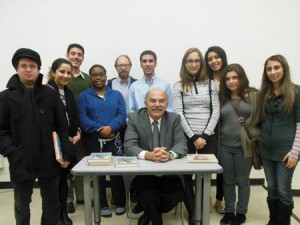Suren Oganessian
Staff Writer

Photo: ASP Archive
“David of Sassoun”is an Armenian Epic whose impact on Armenian culture has been great, from statues commemorating “David” both in Fresno and Yerevan, to commemorative coins and stamps, to an annual holiday in Armenia where the Epic is celebrated with recitations and music.
On Thursday, November 21, 2013, the Armenian Studies Program announced the official launch of its fourth title in the Armenian Series of The Press at Fresno State, David of Sassoun: Critical Studies on the Armenian Epic, edited by former Armenian Studies Program Director Dr. Dickran Kouymjian and Prof. Barlow Der Mugrdechian, current Director of the Program, chronicling the study of Armenia’s most famous folk epic.
The formal launch was marked by opening statements by Dr. Vida Samiian, Dean of the College of Arts and Humanities and director of The Press, followed by a presentation on “The Armenian Epic” by Prof. Der Mugrdechian. Closing remarks were made by Prof. Sergio La Porta, Haig and Isabel Berberian Professor of Armenian Studies at Fresno State.
David of Sassoun includes essays by Charles Dowsettt, Dickran Kouymjian, Aram Ter-Ghevondian, Earl R. Anderson, Chaké Der Melkonian-Minassian, Frédéric Feydit, Arpiné Khatchadourian, Aram Tolegian, Vahé Oshagan, and an original poem by Ashough Hovani, all of whom were originally present at a scholarly symposium held at Fresno State. The symposium had been organized by Dr. Kouymjian a year after he established the Armenian Studies Program at Fresno State, and he saw it as Fresno’s contribution to the centennial of its first publication.
“David of Sassoun” has become a symbol of Armenian pride and identity and UNESCO has included the epic on its list of Intangible Cultural Heritage in 2012, giving it international recognition.
Originally the epic was told orally and was passed down from generation to generation for around a millennium before finally being transcribed and published by ethnographer and priest Garegin Srvantztiants in 1874. He transcribed the epic, as told by a villager named Krpo from the region of Moush.
Scholars believe that the core of the epic hearkens back to when the Arabs ruled Armenia between the 8th and 10th centuries, although the enigma of the epic is that no Armenian literary sources allude to it before 1874, and only in isolated Arab and Portuguese sources is it briefly mentioned. This may have been because for centuries the most educated and literate of Armenian society were priests whose priority was the Bible, while “David of Sassoun” was told and retold by the rural common folk.
In 1939, the Armenian Soviet Socialist Republic published a “1000th Anniversary Jubilee Edition” of the epic. Scholars edited 65 known variants of the epic and integrated them into one official comprehensive edition with all four cycles, putting the epic into modern Eastern Armenian as well. This has presented its own challenges, as the epic was usually recited in the dialect of the village where it was told. In the variants collected by scholars, the number of times each cycle was repeated varied, and only one version actually included all four cycles.
Professor Sergio La Porta concluded the event with comments on the epic, noting that the Genocide had caused the disruption in the transmission of the epic to future generations. He also noted that the 1939 Jubilee Edition created a single, canonized version of the epic, whereas many new variants have recently emerged that have yet to be fully evaluated. He called for future research on the epic and stated that David of Sassoun: Critical Studies on the Armenian Epic is a valuable addition to the understanding of the epic and how it has been received.
All of these topics and more are covered in depth in Der Mugrdechian’s and Kouymjian’s new book, available from The Press at Fresno State.
David of Sassoun is a welcome addition to the personal library for anyone interested in this indispensable piece of Armenian heritage and culture.
For information about how to order the book contact The Press through their website http://www.thepressatcsufresno.org/ or by calling 559-278-3056.
 Hye Sharzhoom Armenian Action
Hye Sharzhoom Armenian Action